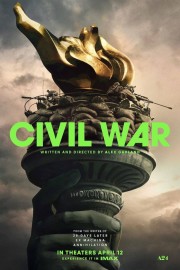Civil War
I’ll admit that there’s a part of me that is frustrated with Alex Garland not explaining how America dissolved into a three-sided civil war in his new film. I understand that it’s a deliberate choice made by the writer-director, but that makes the film feel politically muted in a way we might hope it wouldn’t be. He does give us hints, however, in the discussions between the four journalists we are following on our way to Washington D.C. throughout “Civil War,” as well as in the speeches we hear from the President (Nick Offerman) throughout the film. In those hints, it seems as though it’s in the not-so-distant future, and yet, it feels futuristic, due to its deliberate pairing of Texas and California as a united Western Front, and Florida as establishing its own independent government. But Garland isn’t looking to build a concrete, sensical political landscape based on our present, but a cautionary tale for our future- if we continue down this path, this is our future. It’s an unsettling message.
Having journalists be at the center of “Civil War” is an important choice, and a great one. What we hope for journalism is that it is capable of giving us an objective view of the world apart from ideology and agenda. The quartet of Lee (Kirsten Dunst), Joel (Wagner Moura), Sammy (Stephen McKinley Henderson) and Jessie (Cailee Spaeny) all exist on a spectrum of experience, and how they view the job, best reflected by how Lee- an experienced war photographer- shoots things in color, while Jessie- an ambitious upstart who idolizes Lee- shoots in black-and-white. (I’m not going to lie, this representation of how the two photographers view the world resonates with how I feel about current political discourse; whereas I- after 46 years- try to see people in all their natural complexity, it feels as though younger generations, while more accepting of diversity of people, views ideology in very rigid ways.) What they all feel that links them is the desire to show the world through their own distinct lens- how they perceive it- while also being honest about it. They are constantly working with multiple sides to get their photographs, their stories. With the way humanity has debased itself, valuing some lives more than others, the work of journalists is more important than ever. Unfortunately, we live in a world now where journalism and propaganda have had their lines blurred in ways that might be the root cause of an actual modern American civil war. That this side of the journalistic spectrum is not really explored in Garland’s film makes it feel incomplete, even in its strongest narrative elements. “Civil War” often depicts a romantic, nostalgic side of journalism that simply does not exist as the default setting anymore, although the film’s final 15 minutes- where Jessie (whose character arc throughout the film is that of a naïve novice seemingly playing journalist, until she’s given a chance to shoot history) reaches her final form, and seemingly loses any sense of humanity- is shattering.
One thing has been consistent in Garland’s career as a genre filmmaker, whether you’re going back to his collaborations with Danny Boyle or his own directorial efforts like “Ex Machina” or “Annihilation”- he is a filmmaker interested in big swings. In “Civil War,” he has mounted probably his biggest landscape yet, one which he puts us right front and center in the action, taking us on to the front lines with these war correspondents as they try to navigate, and chronicle, a dehumanizing moment in American history. And yet, the film feels small because of the perspective it takes. The film is drawing from plenty of war film influences, from “Apocalypse Now” to “Full Metal Jacket” to “Saving Private Ryan,” and it’s an ugly business. Rob Hardy’s cinematography- especially as seen on a modern IMAX screen- is both epic and feels very intimate. His use of the soundtrack is a mixed bag; the sound design- goosed by a score from frequent collaborators Geoff Barrow and Ben Salisbury- is exceptional, but his choice of songs at times is maddening, and throws the tone of the film off. As with its narrative focus, there’s some negatives to be considered along with the good. The more I reflect on the film, however, the good is very good.
As I think about how to conclude this review, I find myself going back to the film’s lack of context for its depicted war. We currently live in a world so politically divided that everything not agreeing with our personal worldview is “fake news” or propaganda; where lies about election fraud led to a mass attack on the US Capitol; where social media allows us to silo ourselves off from conflicting views of the world than our own, and where one side often threatens violence of its opponents instead of trying to have meaningful debate on the issues. While we get hints of nationalistic influence over people, and how war allows them to act of those impulses in a scene where the journalists come across a mass grave, most of what we see are nameless faces, fighting a war for no reason whatsoever. While all war feels meaningless, especially the longer it continues, there’s always a reason for their beginning, even if the day-to-day death that occurs in them is monotonous, numbing, and obscure that larger context of why people are fighting. This is why journalists matter more than ever at humanity’s worst moments- their work can help us remember the why’s for events happening, and not just report on the events themselves, waiting for the moment they capture history. By leaving that out of his film, “Civil War” ignores one of the journalist’s most important jobs- not just to show us what’s happening, but remind us of what led us here in the first place, so that- in the future- we might not be doomed to repeat history.










